

Gilsonite in Water Based Drilling Muds (WBM)
It is essential in water-based mud to use an additive that can resolve in water. Gilsonite is not solvable in water by nature. Therefore a chemical procedure with Sulfur must be applied to the natural bitumen at a temperature between 100-140 degrees Celsius. This process is called Sulfonating the Gilsonite. The Sulfonated Gilsonite is solvable in water, making it suitable for water-based muds (WBM).
In water-based Drilling Muds, it is essential to have a FLUID LOSS CONTROL agent which is solvable in water. Sulfonated Gilsonite possesses this characteristic while the Gilsonite does not. Therefore having the correct formula and composition to make the Sulfonated Gilsonite is the key factor in supplying FLC to water based muds. Using Gilsonite in its Sulfonated form provides an easy mixing during the mud making and decreases the differential sticking significantly. In addition, the Sulfonated Gilsonite causes better lubricity and flow. Sulfonated Gilsonite is solvable both in Water and Oil matters in order to be applied to all drilling muds; yet applying to Water-based muds are suggested.
In the current Oil Market, the HSE regulations are pushing the Oil Based Muds away. Therefore the demand for Water-Based Muds, and as a result, the demand for Sulfonated Gilsonite is rising. Considering the economic aspect of the item comparing to its alternative (Sulfonated Asphalt), it is safe to say that consumption of the Gilsonite composition in WBM will be increasing in the coming years.
The present invention deals with the consequences of using water-based drilling Gilsonite muds. When the hydrostatic pressure of the drilling mud in the wellbore exceeds the inwardly acting pressure of the surrounding formation, the drilling mud is forced into the surrounding formation through the walls of the wellbore.
RAHA Group’s supply of Sulfonated Gilsonite is a customized production with internal company formula and by using it fewer additives can be applied to the mud mix resulting in to even more economical approach. It can be applied in tight formations and also in different temperatures since the base material of the Iran Gilsonite used for production has a softening point of above 180 degrees Celsius.
Advantages
- Sulfonated Gilsonite is more economical than Sulfonated Asphalt.
- It can emulsify water with Sea Water with Oil.
- Maintains a low shearing rate to be under HTHP
- Produces proper mud cakes
- Gilsonite acts as Shale Stabilizer.
